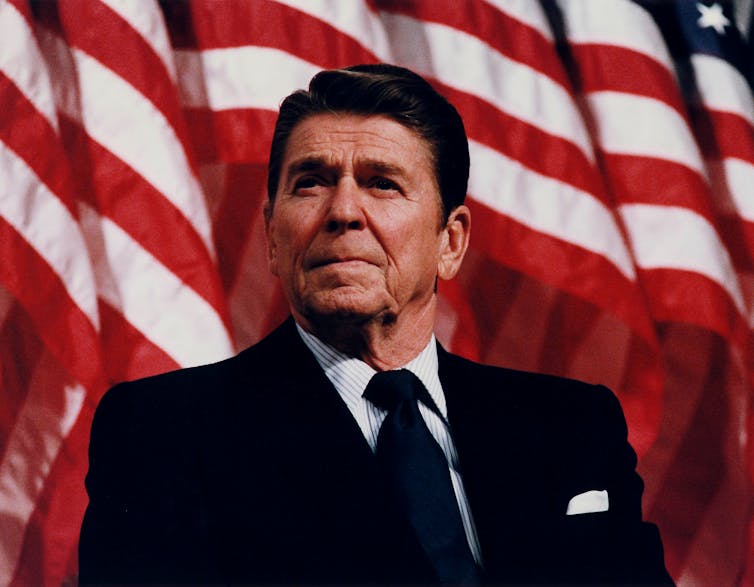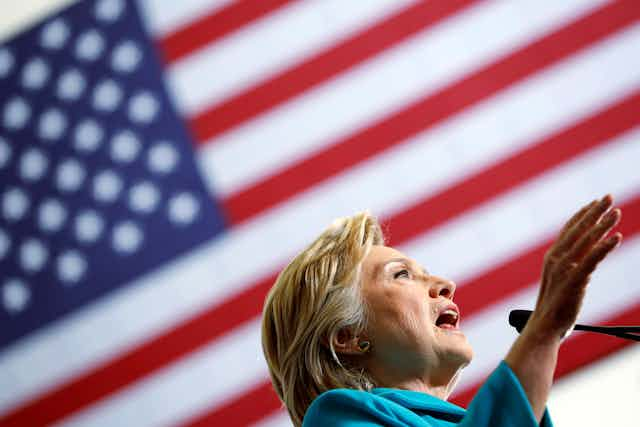How does a belief in American exceptionalism shape foreign policy?
The views of the presidential candidates will likely be on display during a national security and military affairs forum hosted by the Iraq and Afghanistan Veterans of America and NBC News this week. What may be most surprising is not what the candidates say, but the way in which they say it. Donald Trump dislikes the term “American exceptionalism” and refuses to use it. Hillary Clinton said in August, “If there’s one core belief that has guided and inspired me every step of the way, it is this: The United States is an exceptional nation.”
She is not the only Democrat making this profession of faith. Two years earlier, Obama declared, “I believe in American exceptionalism with every fiber of my being.”
This sort of language has historically been associated with Republicans, who added a belief in American exceptionalism to their 2012 party platform. Now, Ronald Reagan’s “shining city on a hill” is moving across the aisle. In adopting such rhetoric, however, Democrats are also trying to reframe it.
American exceptionalism – defined as “the conviction that our country holds a unique place and role in human history” – has long celebrated a singular people specially called to spread liberty and democracy to the world. The exceptionalism touted by Obama and Clinton celebrates a diverse country that sees other nations as essential partners for global good. Theirs is an American exceptionalism with a cosmopolitan twist.
In a course I teach on the history of American exceptionalism, my students and I look at how this rhetoric has evolved into a story of a nation with a grand and global mission. Politicians, standing in the middle of the story, often choose a beginning that will define America and direct the country to its proper end. Knowing how that story has traditionally been told, we can see how Obama and Clinton are adapting it to redefine the nation’s identity and purpose in the world.
Cosmopolitan exceptionalism
In her embrace of American exceptionalism, Clinton stated, “We celebrate diversity as a source of national strength.”
Consider the contrast between this statement and the ideas of Josiah Strong, a 19th-century Protestant clergyman whose unexpectedly popular book “Our Country: Its Possible Future and Its Present Crisis” spelled out what many of that time believed about America. Strong contended that the Anglo-Saxon race was “the representative of two great ideas”: civil liberty and a pure, spiritual Christianity. These “two great needs of mankind” flourished best in America, Strong contended. And as America increasingly embraced them, they would spread to all the world.
Strong’s hope for a transformed world reveals how theology and politics became intertwined in the history of American exceptionalism. During the 19th century, the story of America settled on a narrative of God-given liberty – a tale of self-government spreading from the Puritans through the Founders to a future world saved by the grace of America. As the influential preacher Washington Gladden asked in 1909, “Is there not work to do in the salvation of the world which can only be done on the scale of the nation?”
The idea was that God works his purposes primarily through nations, not churches – and specifically through one nation, the United States. That idea appealed to many at a time when the United States was rapidly expanding its influence around the world. It gave American power a religious purpose of redemption.
Such was the Cold War ideology that fueled Ronald Reagan’s “shining city on a hill.” Reagan loved to tell a story of America that began with John Winthrop, the first governor of Massachusetts Bay. Shortly before arriving, Winthrop declared to fellow Puritans: “we shall be as a city upon a hill.” Borrowing this phrase from Matthew 5:14, Winthrop hoped New England would model godliness, along with all other true Christian communities across the world. According to Reagan, however, the Puritans came primarily in search of freedom. And ever since, Reagan claimed, Americans had remained true to that noble ideal, serving as a beacon of liberty in a world threatened by communism.
When Mario Cuomo challenged Reagan, arguing that America was really a “tale of two cities” – a story of success for the few and constraints for the rest – Democrats became known as the opponents of American exceptionalism. This is the view Obama tried to flip when he set Trump against Reagan: “Ronald Reagan called America ‘a shining city on a hill.’ Donald Trump calls it ‘a divided crime scene’ that only he can fix.”

For many years, Obama, like Reagan, has sketched a story of America that begins with the Puritans, our “earliest settlers,” and carries forward by remaining “true to our founding documents.” Yet, the national narrative he offers has attempted to alter Americans’ understanding of what Strong called our country’s “present crisis” and “possible future.” For both him and Clinton, the military exemplifies American exceptionalism – not because of its might, but because of its diversity. Obama said, it represents “every shade of humanity, forged into common service.”
That celebration of diversity includes affirming other nations’ contributions to global good. According to Clinton, “American leadership means standing with our allies because our network of allies is part of what makes us exceptional.” In this newer exceptionalism, America fights not only for others, but with others. As Obama explained, “what makes us exceptional is not our ability to flout international norms and the rule of law; it is our willingness to affirm them through our actions.” In the language of American exceptionalism, Obama has tried to claim that America is exceptionally good at following norms set by international coalitions.
A new exceptionalism, an old problem
While it may seem radically new in some ways, this rhetoric of Obama and Clinton reveals a longstanding tension in the language of American exceptionalism: How should a nation that sees itself as a savior shape its foreign policy? When it comes time to act, after all, the nation must decide whether it is acting primarily in its own interest or in the interest of others.
In his book, Strong proclaimed, “Our plea is not America for America’s sake; our plea is America for the world’s sake.” What is good for the nation, he was saying, is good for the world. In fact, Strong’s entire book is based on the premise that the savior, America, must be preserved from several evils, including Mormons, Catholics and immigrants, in order to save the world.
Over a century later, Clinton much more subtly made the same kind of claim, that serving American interests ultimately serves the world. Clinton declared: “American leadership means leading with our values in pursuance of our interests, in protection of our security.” The entire sentence centers on the values, interests and security of the United States. But Clinton continued: “At our best, the United States is the global force for freedom, justice and human dignity.”
Together, these back-to-back lines eliminate any difference between national goals and global good. In the rhetoric of American exceptionalism there is no distinction between self-interest and world service.
While Obama and Clinton have endorsed a newer, more diverse and cosmopolitan exceptionalism, its primary narrative nonetheless remains intact. America is “the indispensable nation,” as Clinton reiterated. She offers a vision of the world as a round table where America, paradoxically, remains seated at the head.

